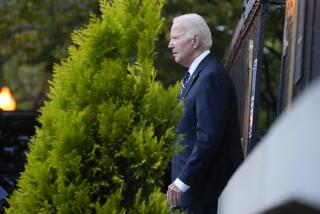Agents Missed Marijuana Use : FBI to Study Ginsburg Probes, Sessions Says
WASHINGTON â FBI Director William S. Sessions said Monday that his agency must review its five background investigations of Judge Douglas H. Ginsburg to determine why agents did not learn--as the news media did--of the former Supreme Court nomineeâs marijuana use.
âPublic confidence in the work product of the bureau is of great importance to the bureau and to the American public generally,â Sessions said in his first meeting with reporters since taking command of the bureau a week ago.
Ginsburgâs acknowledgment that he had smoked marijuana as a Harvard law professor after reporters raised the question caught the FBI by surprise. Its agents had talked to some of the same sources who alerted the news media. The information had not been turned up in four earlier FBI background investigations of Ginsburg.
Harder Line for Agents
Sessions strongly endorsed the propriety of asking whether nominees to high government posts have used drugs and announced a harder-line policy against employing FBI agents who have tried drugs.
âI do not want FBI agents who have violated the law by using drugs,â said Sessions, who as a federal judge earned the reputation of being tough on drug traffickers. âI think they need to apply somewhere else.â
Until now, the FBI has had a somewhat more flexible position on drug use, accepting some applicants who tried marijuana experimentally and used it infrequently long before they sought to become agents.
âI do believe there are a number of people in this country in all sorts of positions of high public visibility who, by their casualness toward controlled substances, obliterate the good view that young people may have about the dangers of using drugs,â he said.
âDesperately Insecureâ
âLeadership does not come from people who are desperately insecure or seeking peer approbation,â said Sessions, who believes that those characteristics underlie drug abuse.
The new FBI director, noting that he is not a psychologist or social worker, said that âI know this: Iâve been told all my life that children--young people--respond more to example than they do to admonition.â
When Ginsburgâs marijuana use was disclosed, the FBI said that its âinvestigative results are largely dependent upon the integrity of those interviewed during these investigations,â a position that Sessions reiterated Monday.
But Sessions said it âmay beâ that interviews of persons who know the nominee should be conducted under oath, a practice not now followed.
Lying to Agent a Crime
At the same time, he said, âwhen youâre making a statement to a federal investigator and you know his identity, I believe (Section) 1001 comes into play,â a reference to the section of the federal criminal code that makes it a crime to lie to an FBI agent, punishable by up to five years in prison and a $10,000 fine.
If the FBIâs review determines that some of those interviewed gave false information, the matter would be referred to the Justice Department for possible prosecution, Sessions said.
Floyd I. Clarke, assistant FBI director for investigations, said that he had already ordered a review of the background investigation on Ginsburgâs Supreme Court nomination.
20 to 30 Interviews
Clarke said he was surprised that the marijuana information had not been turned up by the FBIâs inquiries. He estimated that agents had conducted 20 to 30 interviews in connection with Ginsburgâs Supreme Court nomination and that 143 interviews of more than 100 persons had been done for all five federal posts to which he had been named.
Nominees themselves are not asked specifically whether they have used drugs, Clarke noted, but the federal application form is being revised to include such a question.
But colleagues, employers and others who know the applicants are asked by agents about any drug use on the part of nominees, Clarke said.
More to Read
Sign up for Essential California
The most important California stories and recommendations in your inbox every morning.
You may occasionally receive promotional content from the Los Angeles Times.










